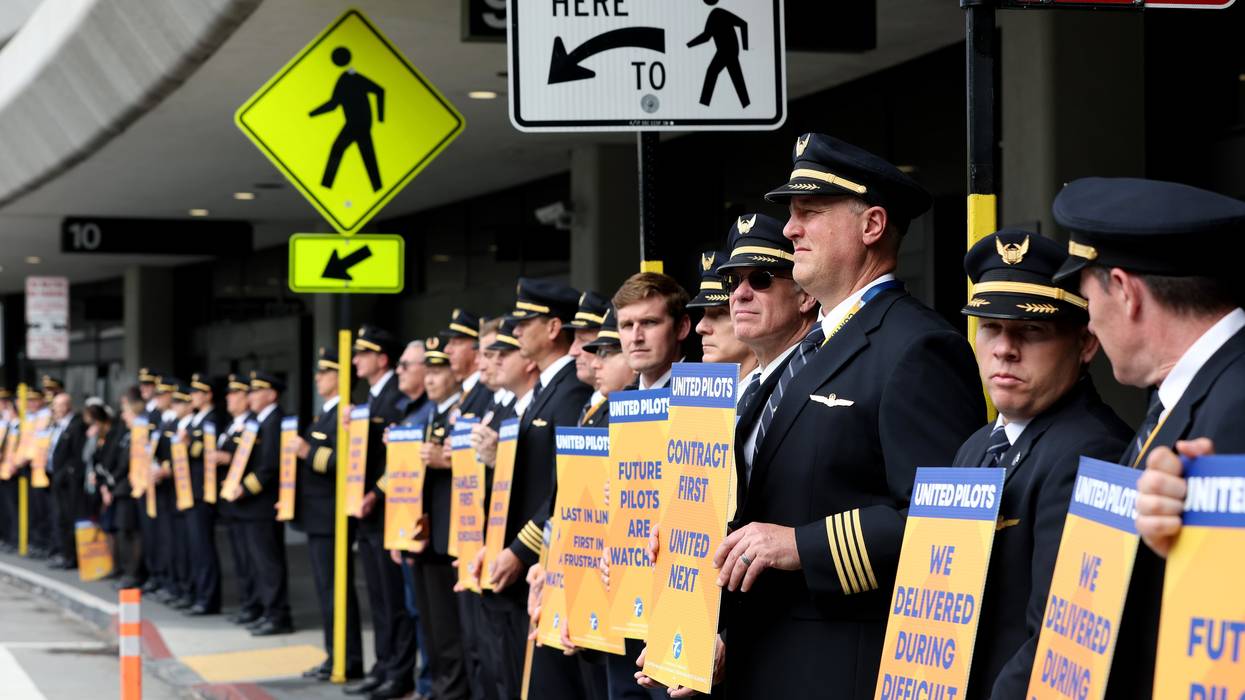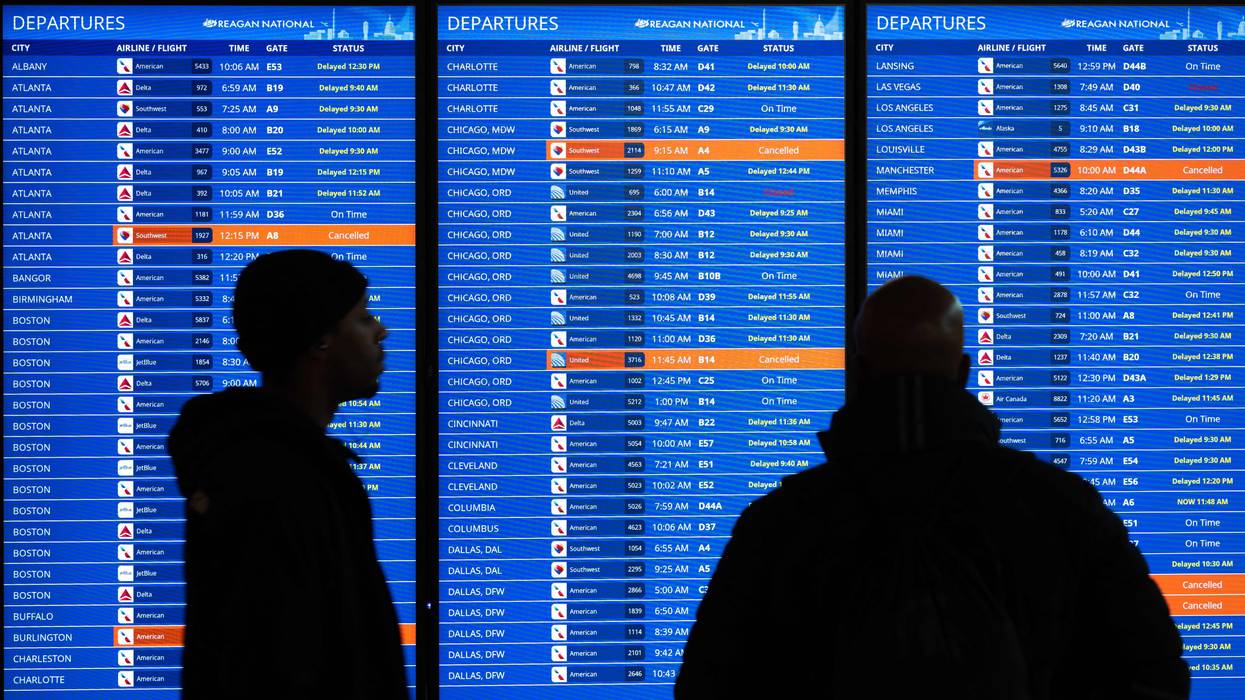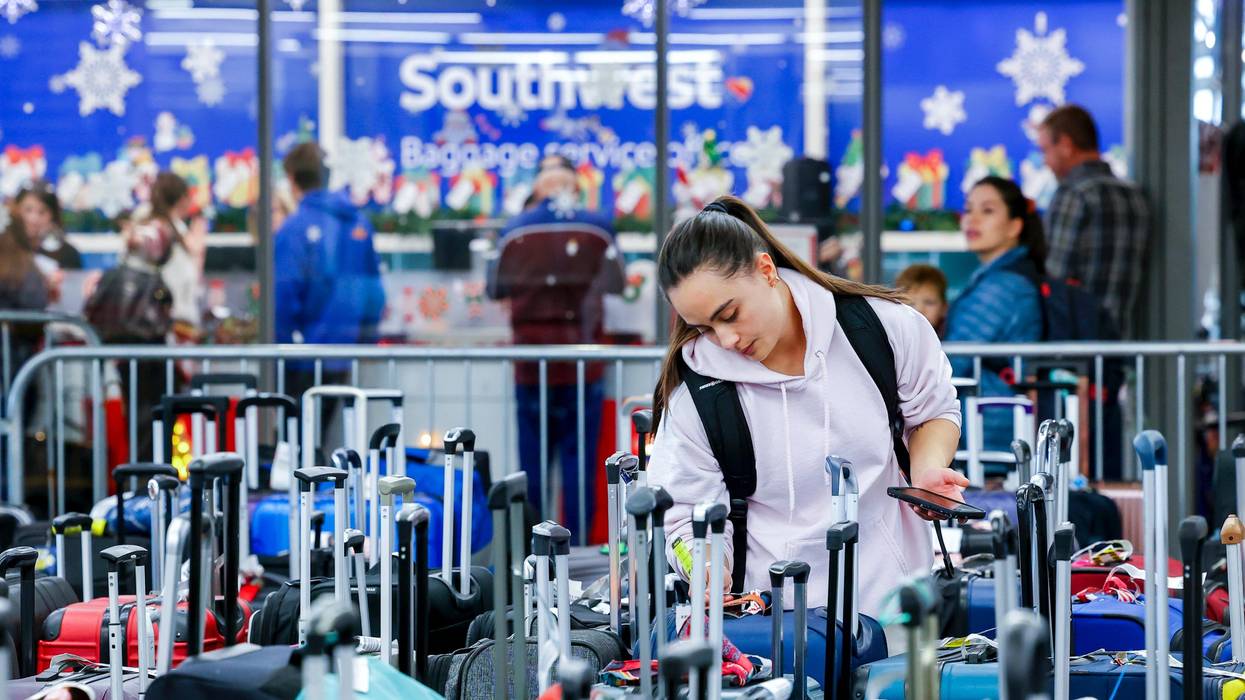United Pilots Picket for Better Contract After American, Southwest Counterparts Authorize Strikes
On the heels of strike-authorization votes by American and Southwest pilots, United pilots protested at airports across the U.S. on Friday to tell management that "enough is enough."
Following what the Air Line Pilots Association called "more than four years of empty promises," 3,000 off-duty United Airlines pilots represented by the union protested at major airports across the U.S. on Friday, demanding the finalization of a contract with higher pay and humane scheduling practices.
"Thousands of United pilots are picketing coast-to-coast today to deliver management a message they cannot ignore: Enough is enough," Capt. Garth Thompson, chair of the United ALPA master executive council, said in a statement.
"United management needs to stop slow-rolling negotiations... and do the right thing for their pilots."
"We have been stuck with an antiquated scheduling system and a contract nowhere near industry-leading standards," said Thompson. "We want United to succeed as industry leaders, and every day that passes without an agreement is another day the best and brightest future aviators go elsewhere."
United pilots—joined by ALPA president Capt. Jason Ambrosi, fellow ALPA pilots, and union supporters—demonstrated in front of terminals at airports in 10 cities as well as outside the company's flight training center in Denver.
Association of Flight Attendants-CWA president Sara Nelson was among those who participated in an act of solidarity.
"I am proud to stand here today to send United Airlines management a message that the airline's pilots have the full backing of their international union in their fight for the contract they have earned," said Ambrosi, who leads the 69,000-member union and joined a picket line in Chicago. "United management needs to stop slow-rolling negotiations that have dragged into their fifth year and do the right thing for their pilots."
Management has failed "to recognize the value pilots bring to the overall success of the airline," ALPA said. "United pilots were there for customers during one of the worst times for travel in recent history, and they also helped United Airlines emerge from the pandemic stronger than before."
Thompson, who called Friday's nationwide informational picket a "resounding success," stressed that "United pilots will always be there for our customers."
"Unfortunately," he added, "the same cannot be said about management, who seems to think that a last-minute cancellation of a United pilot's scheduled day off, or abrupt trip reassignments that extend into planned days off, is acceptable for a United pilot's family."
"This old pilot contract impacts our ability to maintain a healthy work-life balance," Thompson continued. "United pilots will deal with this adversity in our usual professional and safe manner. We will continue to work in 2023 despite staffing shortages in Air Traffic Control facilities, aggressive summer schedules, capacity constraints, and weather." However, he noted, "United pilots want the company and the public to know that the bold 'United Next' growth plans cannot work without an updated pilot contract."
"This old pilot contract impacts our ability to maintain a healthy work-life balance."
The action by United pilots comes in the wake of a pair of successful strike-authorization votes by pilots at other airlines.
On May 1, 95% of American Airlines pilots voted to authorize a strike. (Of the airline's 15,000 pilots, 96% participated, with 99% expressing support for a possible strike).
"We will strike if necessary to secure the industry-leading contract that our pilots have earned and deserve—a contract that will position American Airlines for success," said Capt. Ed Sicher, president of the Allied Pilots Association. "Our pilots' resolve is unmistakable. We will not be deterred from our goal of an industry-leading contract."
"The strike-authorization vote is one of several steps APA has taken to prepare for any eventuality and use all legal avenues available to us for contract improvement and resolution," Sicher noted. "The best outcome is for APA and management to agree on an industry-leading contract—achieved through good-faith bargaining—benefiting our pilots, American Airlines, and the passengers we serve."
On Thursday, 97% of Southwest pilots voted to authorize a strike. (Of the airline's 10,000-plus pilots, 98% participated, with 99% expressing support for a possible strike).
"This is a historic day, not only for our pilots but for Southwest Airlines," said Capt. Casey Murray, president of the Southwest Airlines Pilots Association. "The lack of leadership and the unwillingness to address the failures of our organization have led us to this point. Our pilots are tired of apologizing to our passengers."
Murray and other union leaders have attributed Southwest's meltdown last winter to executives' yearslong refusal to invest in much-needed technological upgrades despite benefiting from billions of dollars in federal aid during the first two years of the Covid-19 pandemic.
"We want our passengers to understand that we do not take this path lightly," Murray said Thursday. "We want our customers to be prepared for the path ahead and make arrangements on other carriers so that their plans through the summer and fall are not disrupted."
United's 14,000 pilots could be next in line to vote on strike authorization.
As The Associated Press reported Saturday, "Pilots at all three carriers are looking to match or beat the deal that Delta Air Lines reached with its pilots earlier this year, which raised pay rates by 34% over four years."
"United has proposed to match the Delta increase, but that might not be enough for a deal," AP observed. Citing Thompson, the outlet noted that "discussion about wages has been held up while the two sides negotiate over scheduling, including the union’s wish to limit United's ability to make pilots work on their days off."
The nation's pilots "are unlikely to strike anytime soon, however," AP reported. "Federal law makes it very difficult for unions to conduct strikes in the airline industry, and the last walkout at a U.S. carrier was more than a decade ago."
"Under U.S. law, airline and railroad workers can't legally strike, and companies can't lock them out, until federal mediators determine that further negotiations are pointless," the outlet explained. It continued:
The National Mediation Board rarely declares a dead end to bargaining, and even if it does, there is a no-strikes "cooling-off" period during which the White House and Congress can block a walkout. That's what President Bill Clinton did minutes after pilots began striking against American in 1997. In December, President Joe Biden signed a bill that Congress passed to impose contract terms on freight railroad workers, ending a strike threat.
Regardless of the legal hurdles to a walkout, unions believe that strike votes give them leverage during bargaining, and they have become more common. A shortage of pilots is also putting those unions in particularly strong bargaining position.
Although Congress is highly unlikely to permit an airline strike, disgruntled pilots could still cause disruption through "work to rule," Arthur Wheaton, director of labor studies at Cornell University, told AP.
"They could say, 'We're not working any overtime,'" said Wheaton. "I don't anticipate the pilots trying to screw up travel for everybody intentionally, but bargaining is about leverage and power... having the ability to do that can be a negotiating tactic."


